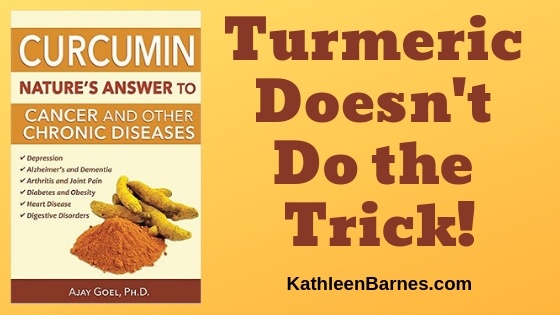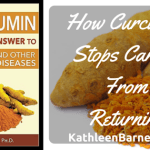Note from Kathleen: It seems that I am in the midst of another spate of friends and friends of friends being diagnosed with cancer. It breaks may heart. Yet I have seen the benefits of curcumin, even in the cases of several friends with advanced stage cancer. Yet many think that turmeric is as effective as curcumin. It is not. Plain and simple. This excerpt from Curcumin: Nature’s Answer to Cancer and Other Chronic Diseases by Dr. Ajay Goel (Take Charge Books) may give you some insight:
If you love curry, you’ll be familiar with turmeric, a popular vividly colored golden spice.
Turmeric in itself has a plethora of health benefits, if you’re willing to eat it in huge quantities from childhood on. If not, you’ll want to use curcumin, a component of turmeric that has powerful and proven effects against cancer.
Botanically known as Curcuma longa, the turmeric rhizome is a member of the antioxidant-rich ginger family.
You might be understandably skeptical when you hear that this humble Indian spice can prevent, treat and sometimes even cure a wide variety of serious diseases. These include everything from cancer, heart disease, the pain of all types of arthritis and even “incurable” diseases like diabetes and Alzheimer’s. Curcumin has shown positive effects in treating every single disease for which it has been studied.
For centuries, this super plant has given the gift of long life and robust health to my ancestors in India, for whom various types of curries—always made with turmeric—are a dietary staple eaten several times a day.
It is also an integral part of religious traditions in the Indian Hindu culture. Its golden paste applied to the forehead is used in devotional ceremonies and weddings.
For more than 6,000 years, turmeric has been used as a medicine in one of the oldest systems of traditional medicine, Ayurveda, which seeks to bring balance to the body’s elemental substances and energy centers.
Recent research shows that most of the benefits attributed to turmeric in the Ayurvedic tradition actually are attributed to curcumin. It is sometimes called “the Golden Goddess” because of its vast healing powers.
Now we get down to the 21st century practical application:
Inside turmeric is a compound called curcumin, which is found in its rhizome (the stem of the plant found underground). Curcumin is responsible for the golden orange color of turmeric, and is perhaps the most powerful naturally occurring medicine known to humankind today. In simple terms, turmeric is the spice and curcumin is the medicine.
However, there is very little curcumin in the spice turmeric. If you’ve seen cheap turmeric supplements on the market, understand that they only contain 2 to 5% curcumin, which may or may not be usable by your body. They’re not likely to have much effectiveness in terms of prevention or treatment for the diseases we’re talking about. Curcumin is many times more powerful than turmeric.
In the 21st century, curcumin’s medicinal value is backed by voluminous research that credits its healing powers to its exceptional antioxidant and anti-inflammatory properties.
Curcumin is by far one of the most powerful antioxidants known to science, hundreds of times more powerful than blueberries, which have substantial antioxidant capabilities themselves.Curcumin literally scrubs the oxidative “rust” from your cells, preventing serious disease and reversing diseases you may already have. It helps stop cell deterioration and restores the cellular genetic codes to youthful levels, ensuring those cells will reproduce more like they did when you were young On the ORAC (Oxygen Radical Absorbance Capacity) scale that rates the antioxidant power of foods, the antioxidant power of the more bioavailable preparations of curcumin rate over 15,000 per 1 single gram, while antioxidant-rich blueberries have only a 600 ORAC rating per single gram! This means that just one high-quality curcumin capsule delivers more than 25 times the antioxidants as the same amount of blueberries.
We’ll learn more about the connection between inflammation and cancer in the next chapter, but let it suffice to say here that curcumin’s antioxidant superpowers result in lower levels of inflammation and lower risk of cancer and a host of other chronic diseases.
More important, from the viewpoint of damaged cell division found in cancer, curcumin also tells these cells to die when their time comes, as ordained by nature, which stops tumor growth. It also helps kill cancerous tumors by cutting off their blood supply, stops the spread of cancer and kills cancer stem cells that stay alive in your blood stream for years, preventing recurrences of old cancers. It even enhances the effectiveness of chemotherapy drugs and radiation therapy commonly used in conventional cancer treatment.
Don’t miss my other articles and excerpts about curcumin – https://kathleenbarnes.com/category/curcumin/








HOW MUCH CURCUMIN DOES A PERSON NEED?
I take 375 mg a day, generally for arthritis and anti-inflammatory purposes as well as Alzheimer’s prevention.